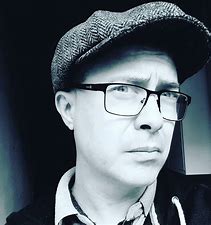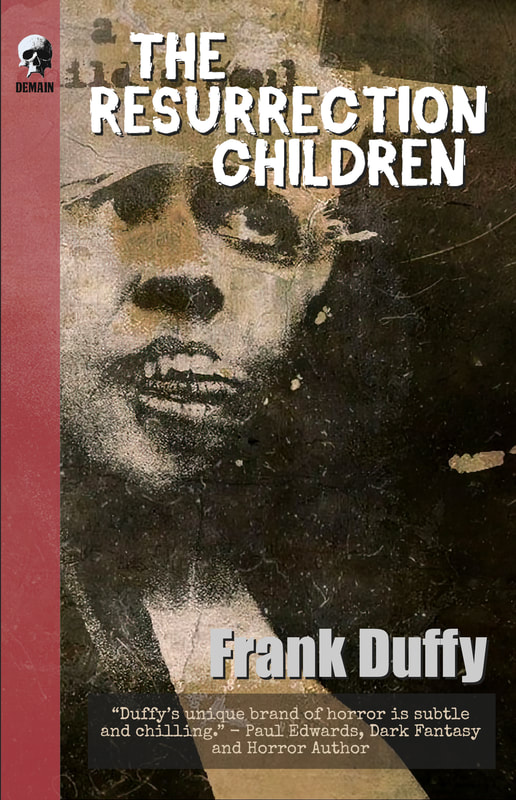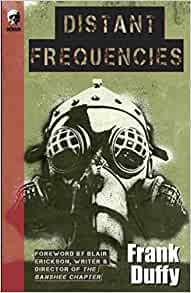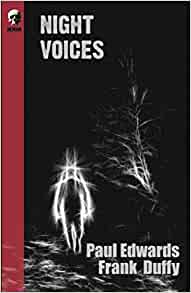|
|
|
September 30th sees the publication of Frank Duffy’s new novel The Resurrection Children (cover by Adrian Baldwin; central artwork by Roberto Segate). This is Frank’s third release by DEMAIN (Distant Frequencies and Night Voices (with Paul Edwards) being his other titles. Dean and Frank are also currently working on a couple of very secret projects which they hope to be able to announce soon but for now, here’s the transcript of their recent chat/interview.
DEMAIN PUBLISHING: Hey Frank, great to talk with you again, exciting times with your The Resurrection Children for sure [well done by the way !]. For those that don’t know you/your work, can you tell us a little of your background and whether that has had some influence on you as a writer. FRANK DUFFY: Hi Dean, great to be back. And sure - I grew up in a working class household in which life was extremely tough for us as a family. Statistically speaking, we might have ended up fulfilling a certain societal expectation if it hadn’t been for the resilience and bravery of my mother. Luckily, she somehow managed to steer us in the right direction, although she sacrificed a huge amount in order to do so. Naturally, my early fiction reflected that, if not overtly, then the stories were at the very least thematically tinged by such experiences. There was also one part of my childhood when I went from living in a typical provincial northern village to spending summers on the streets of Toxteth. This was the early 80s, and as anyone from those days remembers, Toxteth was literally tottering on the edge of collapse — dreadful housing conditions, mass unemployment, locals regularly arrested or beaten up by the police. And yet, in spite of this, I was able to see first-hand how life differed from that of a village. Even though I was very young, the experience of two separate childhood environments in which the quality of life was alarmingly different taught me a lot about how the world worked. And this was instrumental in helping me write about subjects and people I might never have had the ability to portray with any real degree of understanding. So, on the one hand, I was able to set many stories within the fictional village of Chapel Hill, and on the other hand, I wrote about life in the city, without, I hope, losing any sense of narrative credibility. It’s also important to "grow" the story in the context of its physical landscape; the architecture of the rural versus the urban. My early years, therefore, had a huge impact on the first decade of my writing. That was apparent in the relationship dynamics between specific kinds of characters, the unresolved conflicts that were at the heart of many of the stories, or the geography in which stories unfolded – a wooded lot, a crumbling tenement building, But equally as important has been my life abroad (the last twenty years), which has played as much of a role in informing my work as anything that happened to me before. Without wanting to sound spiritually dramatic, living in another country, Poland, has given me a specific perspective on myself, which I’m not sure might have happened had I stayed in the UK. DP: I hear you totally, it was much the same when I moved to France. It really inspired me and I know my writing changed dramatically. Living abroad does have an impact creatively in my opinion. The fact that you were living in Toxteth I wonder who your horror influencers were (and I’m wondering specifically about Liverpool writers such as Ramsey Campbell, Clive Barker amongst others) FD: A primary school teacher used to read Walter de la Mare's ghost stories to my class every Monday morning after assembly. Broomsticks and Other Tales, and, if I’m not mistaken, Eight Tales. The memory is etched into my brain. At about the same time, I watched my first horror film, Jacques Tourneur’s Night of the Demon. I think it might have been part of a BBC2 double bill. There’s a possibility I only saw it because a babysitter let me stay up. Today, the film remains one of my all-time favourites. I watch it every Christmas, along with another British classic, Dead of Night. DP: Some great titles there – okay, so let’s talk The Resurrection Children. FD: Sure. A young woman vanishes during a Christmas party, and her older brother, a teacher with substance abuse issues, becomes obsessed with solving her disappearance. Not only must he contend with his own addictions, he must also outrace a possible serial killer while coming up against a supernatural entity, the eponymous Resurrection Children. The story takes place in Liverpool during the worst winter on record. DP: Great – did you have to do much research? FD: A lot of the research was already imbedded within my own experience, concerning as it does a teacher of English as a second language — I’ve been teaching in Poland for twenty-two years. However, despite having spent a considerable proportion of time hanging out in Liverpool in the early 90s and later, at the end of the same decade, I had to do a lot more sifting about online in terms of revisiting physical locations, especially on Google Maps. More so because the novel was written before the pandemic, so as you can imagine, even something as simple and straightforward as the name of a restaurant or bar had to be triple-checked. DP: Because of Covid etc did you find the novel difficult to write? FD: Only in the sense that I wanted to write a story whose main protagonist was likeable despite his many human flaws. I really like this character, but he’s definitely his own worst enemy. And that was challenging, keeping him engaging, despite the darkness inside him, and allowing the more negative aspects to rise to the surface. DP: I like it and again hats off and well done. Let’s talk about your biggest creative success so far. FD: I’m going to be boring here and say The Resurrection Children. I admit it’s a cop out, and for many authors, it’s often the default position to name their last work. But in all honesty, as this is my first published novel, having made the leap from short stories/novellas to the longer form, was creatively very, very satisfying. DP: I bet it was. So you and I work a lot in the horror genre, what does horror mean to you? FD: It depends on the mood I’m in. On some days, I think horror, or at least good horror, should defy expectations, subvert tropes, and experiment with tradition. I’m not adverse to more conventional horror, and have enjoyed my fair share of it, but for me personally, I’m looking for something that at least braves new waters. Horror for me should tell a story that raises important questions. I guess what I’m attempting to say, is that horror can take on many different forms in both fiction and cinema. DP: Talking of which is there a new writer or director that interests you… FD: I look forward to anything that Aaron Moorhead and Justin Benson direct or write. Their craftsmanship and storytelling are steeped in the best aspects of the genre. Years ago, they’d probably have been known only to genre fans, but because of streaming services and word of mouth, they’ve gathered quite an impressive following outside of the genre. I'm thrilled that their work is now reaching such a wide audience. They’re masters and deserve the recognition. There’s really no one quite like them. DP: That’s certainly true. Creatively Frank is there something you haven’t yet achieved? FD: Not so much that I haven’t done, more a case of taking it one step further. In 2017, I worked as a screenwriter for American film director Blair Erickson on an eight-part horror series called Heartbreaker (*). That was almost a three-year process, and it taught me a huge amount about the industry and screenwriting. (In my earlier years, I’d written a number of screenplays, even entering them into competitions. Therefore, this was a golden opportunity to put some of that into practice). While the series never went into production and is currently on hiatus, it reignited my desire to go back to writing screenplays and even directing. Since then, I’ve written four feature film scripts, six episodes for a comedy series, and a number of shorts. In 2020, I moved into writing and directing for a small video production company. I wrote 67 scripts catering to the viral ad market (although we filmed probably just under a dozen in seven months), covering a wide range of styles, many of them genre-themed ads. I was also lucky enough to direct two music videos based on my own scripts. As a result of the production job, I managed to kickstart a project that embraces all of the above: directing, screenwriting, and production. The project is currently in its embryonic stages, but I’m very excited by the prospect, and hope I can do it justice. I’ve also joined forces with Blair Erickson once again. I’ve always been interested in exploring computer games and comics, so I was doubly delighted when Blair invited me to be part of a project involving both mediums. Therefore, my writing debut in gaming and comics will hopefully splash down this autumn. *Blair’s film, Banshee Chapter, was a big hit for Netflix in the early days. Thank you Frank for your time, we wish you all the best with your future endeavours and in particular The Resurrection Children. Frank Duffy can be located on Facebook.
0 Comments
|
CategoriesArchives
July 2024
AuthorDean M. Drinkel |




